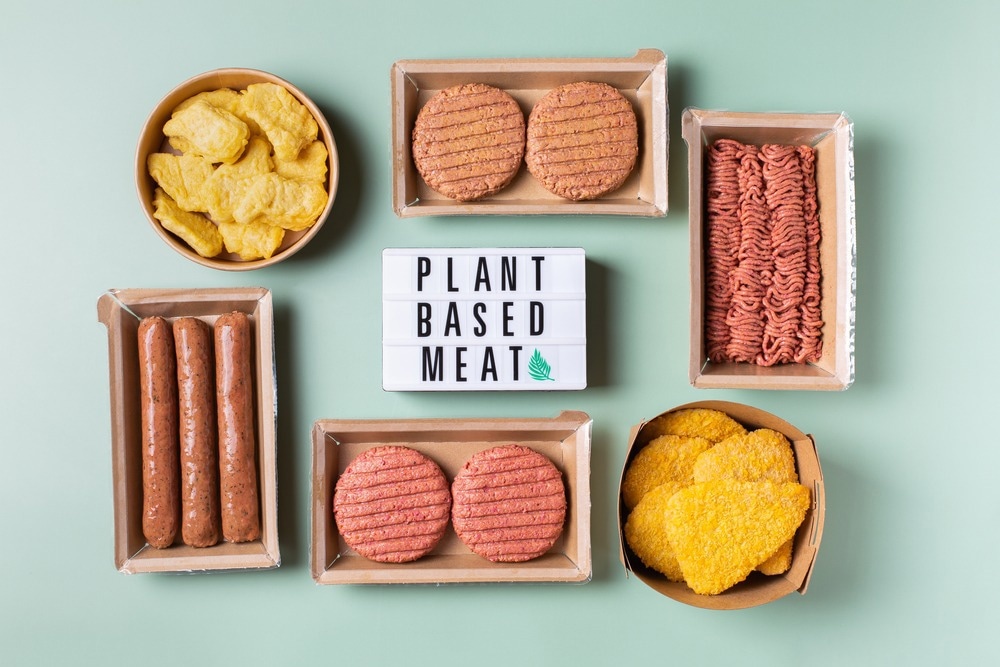Meat alternatives such as plant-based substitutes and cultured meat provide several benefits compared to farmed meat. This, coupled with their increasing similarity to farmed meat in both texture and flavor, has led to a rise in demand for meat alternatives in recent years, prompting questions about whether a significant disruption to the food industry is imminent.
Over the last decade, there has been a substantial increase in consumer demand for alternatives to farmed meat as more people transition to vegan or vegetarian diets and others opt to reduce their meat consumption.
The most common alternatives to farmed meats are plant-based products, which seek to imitate the flavor, texture, and nutritional value of farmed meat using ingredients derived from grains, pulses, and fungi. Another alternative is cultured meat, which is produced in the laboratory using stem cells harvested from live animals, although this is not currently commercially available worldwide.

Image Credit: Antonina Vlasova/Shutterstock.com
What is driving demand for meat alternatives?
The increased demand for these products is largely due to rising awareness of the various issues associated with producing and consuming conventional meat products. This includes animal welfare concerns relating to the treatment and killing of livestock, links between the consumption of red meats and the risk of chronic diseases, and the contributions of livestock agriculture to climate change.
There is also concern surrounding how the agricultural industry will supply enough food for the future human population without increasing agricultural land use, especially as many attempts to increase meat and crop yields have created further problems, such as antibiotic resistance and soil erosion. As such, many consumers are now looking to make more sustainable food choices.
How could meat alternatives solve these problems?
Humans eat only 37% of the crops produced each year, and 46% are used to feed livestock to produce meat. Estimates suggest that current crop yields could feed double the current human population if all harvested crops were eaten directly by humans. Therefore, meat alternatives could help to provide a more sustainable method of feeding a rising global population by facilitating a reduction in the proportion of crops that are fed to livestock.
Increasing consumption of plant-based substitutes and cultured meat would also reduce the land required for animal agriculture, creating more space for land uses that benefit the environment, such as rewilding. Other environmental benefits of plant-based substitutes include the reduced greenhouse gas footprint of these products compared to farmed meat.
The greenhouse gas footprint of cultured meat is more difficult to predict but is expected to be higher than that of plant-based substitutes. However, a large proportion of the greenhouse gas footprint of meat alternatives comes from the energy required to produce the products and could therefore be lowered through the future decarbonization of the energy grid, whereas that of farmed meat is less likely to decrease with time significantly.
Plant-based alternatives also provide consumers with health benefits, as they often have the same nutritional content as traditional meat products but lower saturated fat levels. As for cultured meat, the feasibility of matching the nutritional content of farmed meat in the laboratory is still being investigated, but it may be possible to control the amount and type of fat in cultured meat products, making them somewhat healthier than farmed meat.
As the production of meat alternatives does not involve killing livestock, there are also significantly fewer animal welfare concerns associated with these products than farmed meat. Despite this, the production of cultured meat is likely to require that livestock be kept to harvest their muscle stem cells, causing some to raise animal welfare concerns.
Nevertheless, there are certainly significant benefits to meat alternatives, giving them the potential to disrupt the current state of agriculture as well as the wider food industry.

Image Credit: ivector/Shutterstock.com
The disruption potential of meat alternatives
Due to the rising demand for meat alternatives, the global market value of plant-based substitutes is forecast to increase to $85 billion by 2030 from $4.6 billion in 2018. This has prompted several leading meat processing companies to produce their own plant-based substitutes or invest in those produced by others in anticipation of likely future disruption to the food industry.
Although cultured meat is not yet commercially available worldwide, funding for the research and development of cultured meat products is increasing. This will accelerate the process of getting cultured meat products produced on a mass scale and help ensure that they can contribute to the expected disruption alongside plant-based substitutes.
There are some concerns that public opinion of cultured meat could inhibit its potential to reach a wider audience as consumers may be reluctant to accept it; however, research has shown that many consumers would be willing to try cultured meat, particularly after its benefits are outlined to them. Acceptance will also likely increase as consumers become more familiar with these products.
The exact timing and scale of the disruption likely to be caused by meat alternatives are difficult to predict, but the most extreme estimates suggest that conventional meat could go from sharing 90% of the global meat industry in 2025 to only 40% by 2040. Due to its high similarity to conventional meat in taste and texture, cultured meat is expected to comprise the majority of the remaining 60% share by 2040, with plant-based substitutes trailing slightly behind.
However, there are significant hurdles to overcome before cultured meat can be mass-produced and possibly overtake plant-based meat products as the dominant meat alternative. This includes obtaining regulatory approval for cultured meat products, making improvements to production facilities, and determining appropriate product distribution channels.
Until this happens, plant-based alternatives are likely to play a crucial role in the potential transition from farmed meat to cultured meat in years to come and could thereby lead the start of a permanent shift in the global food industry.
Sources:
- Santo, R.E., Kim, B.F., Goldman, S.E., Dutkiewicz, J., Biehl, E., Bloem, M.W., Neff, R.A. and Nachman, K.E. (2020). Considering plant-based meat substitutes and cell-based meats: a public health and food systems perspective. Frontiers in Sustainable Food Systems, p.134. https://doi.org/10.3389/fsufs.2020.00134
- Bryant, C. and Barnett, J. (2018). Consumer acceptance of cultured meat: A systematic review. Meat science, 143, pp.8-17. https://doi.org/10.1016/j.meatsci.2018.04.008
- Gerhardt, C., Suhlmann, G., Ziemßen, F., Donnan, D., Warschun, M. and Kühnle, H.J. (2020). How will cultured meat and meat alternatives disrupt the agricultural and food industry? Industrial Biotechnology, 16(5), pp.262-270. https://doi.org/10.1089/ind.2020.29227.cge
Further Reading
Last Updated: Oct 26, 2022